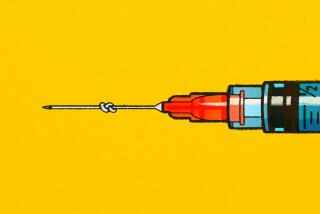It’s Not Voodoo They Do : Alternative Medicine Fans Tackle Skepticism
- Share via
Madelynn Hamilton is on a mission to help the field of alternative medicine shed its snake-oil-and-incense image.
She believes the thousands of clinics where acupuncture, traditional Chinese medicine and other non-Western treatments are practiced should undergo quality reviews similar to those required of hospitals or HMOs.
“One of the reasons that Western medicine doesn’t take this seriously is that it’s not accredited,” Hamilton says. Although Hamilton believes most alternative medical practitioners are legitimate, “there can be great scams as well. I’d like to see the scams eliminated.”
While the mainstream medical community remains largely skeptical, citing a dearth of Western-style scientific research, millions of Americans are trying acupuncture, yoga, vitamins and herbal remedies to improve their health. Some of the nation’s leading medical schools have research programs in alternative medicine. And some health insurers are adding such benefits as acupuncture and chiropractic to their policies.
Hamilton is trying to rally support for accreditation of the roughly 11,000 alternative medicine clinics around the United States. She has some expertise in the area: Her Burbank consulting firm advises hospitals on how to prepare for surveys by accrediting organizations.
Although most states have licensing or certification procedures for acupuncturists, herbalists and chiropractors, there is virtually no other regulation of alternative clinics. The need to accredit alternative medical practitioners will become more pressing, Hamilton says, as private insurers begin to cover alternative treatments for patients in Medicare and other government-funded health programs.
Dr. Steven Rosenblatt, a Los Angeles family-practice physician, supports the idea of accreditation but cautions that it must be done carefully. Rosenblatt, who is also trained in Chinese medicine and is a licensed acupuncturist, is heading an alternative medicine research program at one of traditional medicine’s premier teaching hospitals, Cedars-Sinai Medical Center.
“We have to go forward with accreditation to ensure quality,” he says. On the other hand, “we’re taking a medical art form from the Orient that has its roots in a different culture and are attempting to graft it onto our medical health-care system in this country. This transplant . . . will not be without its attendant problems and opportunities.”
Rosenblatt believes that Western-trained doctors will become more open to the idea of alternative therapies once they see the science behind it. As patients ask about acupuncture or herbs and as stories appear in the popular press, doctors are realizing that the integration of Western and Eastern medicine is a force to be reckoned with.
He recalls a recent discussion with a skeptical doctor during which he pointed out that alternative medicine guru Dr. Andrew Weil was on the cover of the latest Time magazine.
*
After looking at the Time cover, Rosenblatt says, “this guy kind of looked at me and said: ‘You’re right, it’s right in front of us. It’s going to happen.’ ”
Some alternative healers may be resistant to the idea of formal accreditation--after all, traditional Chinese and Indian medicine has been practiced for thousands of years without such interference.
But Dr. Sudhir Bagga, a Torrance family doctor trained in traditional Indian medicine, believes they eventually will support the idea.
With accreditation, the India-born Bagga says, “the insurance companies would feel more comfortable and the alternative practitioners would get more business.”
David Olmos can be reached by e-mail at [email protected] or by fax at (213) 237-7837.
More to Read
Sign up for Essential California
The most important California stories and recommendations in your inbox every morning.
You may occasionally receive promotional content from the Los Angeles Times.










